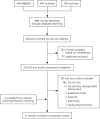Cancer risk assessment tools in primary care: a systematic review of randomized controlled trials
- PMID: 26371271
- PMCID: PMC4569458
- DOI: 10.1370/afm.1837
Cancer risk assessment tools in primary care: a systematic review of randomized controlled trials
Abstract
Purpose: We conducted this review to identify published randomized controlled trials (RCTs) of cancer risk assessment tools used in primary care and to determine their impact on clinical utility (clinicians), screening uptake (patients), and psychosocial outcomes (patients).
Methods: We searched EMBASE, PubMed and the Cochrane databases for RCTs of cancer risk assessment tools in primary care up to May 2014. Only studies set in primary care, with patients eligible for screening, and English-language articles were included.
Results: The review included 11 trials of 7 risk tools. The trials were heterogeneous with respect to type of tool that was used, type(s) of cancer assessed, and outcomes measured. Evidence suggested risk tools improved patient risk perception, knowledge, and screening intentions, but not necessarily screening behavior. Overall, uptake of a tool was greater if initiated by patients, if used by a dedicated clinician, and when combined with decision support. There was no increase in cancer worry. Health promotion messages within the tool had positive effects on behavior change. Trials were limited by low-recruitment uptake, and the heterogeneity of the findings necessitated a narrative review rather than a meta-analysis.
Conclusions: Risk tools may increase intentions to have cancer screening, but additional interventions at the clinician or health system levels may be needed to increase risk-appropriate cancer screening behavior.
Keywords: cancer screening; practice-based research; primary care; risk assessment tools.
© 2015 Annals of Family Medicine, Inc.
Similar articles
-
Clinician-targeted interventions to influence antibiotic prescribing behaviour for acute respiratory infections in primary care: an overview of systematic reviews.Cochrane Database Syst Rev. 2017 Sep 7;9(9):CD012252. doi: 10.1002/14651858.CD012252.pub2. Cochrane Database Syst Rev. 2017. PMID: 28881002 Free PMC article.
-
Drugs for preventing postoperative nausea and vomiting in adults after general anaesthesia: a network meta-analysis.Cochrane Database Syst Rev. 2020 Oct 19;10(10):CD012859. doi: 10.1002/14651858.CD012859.pub2. Cochrane Database Syst Rev. 2020. PMID: 33075160 Free PMC article.
-
Treatment for women with postpartum iron deficiency anaemia.Cochrane Database Syst Rev. 2024 Dec 13;12(12):CD010861. doi: 10.1002/14651858.CD010861.pub3. Cochrane Database Syst Rev. 2024. PMID: 39670550
-
Intravenous magnesium sulphate and sotalol for prevention of atrial fibrillation after coronary artery bypass surgery: a systematic review and economic evaluation.Health Technol Assess. 2008 Jun;12(28):iii-iv, ix-95. doi: 10.3310/hta12280. Health Technol Assess. 2008. PMID: 18547499
-
Systemic pharmacological treatments for chronic plaque psoriasis: a network meta-analysis.Cochrane Database Syst Rev. 2021 Apr 19;4(4):CD011535. doi: 10.1002/14651858.CD011535.pub4. Cochrane Database Syst Rev. 2021. Update in: Cochrane Database Syst Rev. 2022 May 23;5:CD011535. doi: 10.1002/14651858.CD011535.pub5. PMID: 33871055 Free PMC article. Updated.
Cited by
-
Feasibility of Utilizing PREMM Score for Lynch Syndrome Identification in an Urban, Minority Patient Population.J Prim Care Community Health. 2021 Jan-Dec;12:21501327211020973. doi: 10.1177/21501327211020973. J Prim Care Community Health. 2021. PMID: 34053368 Free PMC article.
-
Effect of interventions incorporating personalised cancer risk information on intentions and behaviour: a systematic review and meta-analysis of randomised controlled trials.BMJ Open. 2018 Jan 23;8(1):e017717. doi: 10.1136/bmjopen-2017-017717. BMJ Open. 2018. PMID: 29362249 Free PMC article.
-
The use of a risk assessment and decision support tool (CRISP) compared with usual care in general practice to increase risk-stratified colorectal cancer screening: study protocol for a randomised controlled trial.Trials. 2018 Jul 25;19(1):397. doi: 10.1186/s13063-018-2764-7. Trials. 2018. PMID: 30045764 Free PMC article.
-
The classification capability of the Asia Pacific Colorectal Screening score in Korea: an analysis of the Cancer Screenee Cohort.Epidemiol Health. 2021;43:e2021069. doi: 10.4178/epih.e2021069. Epub 2021 Sep 16. Epidemiol Health. 2021. PMID: 34607403 Free PMC article.
-
Risk prediction tools for cancer in primary care.Br J Cancer. 2015 Dec 22;113(12):1645-50. doi: 10.1038/bjc.2015.409. Epub 2015 Dec 3. Br J Cancer. 2015. PMID: 26633558 Free PMC article. Review.
References
-
- Australian Government Department of Health. BreastScreen Australia. http://www.cancerscreening.gov.au/internet/screening/publishing.nsf/Cont... Accessed Aug 21, 2014.
-
- Australian Government Department of Health. National Bowel Cancer Screening Program. http://www.cancerscreening.gov.au/internet/screening/publishing.nsf/Cont... Accessed Jul 27, 2014.
-
- Australian Government Department of Health. National Cervical Screening Program. http://www.cancerscreening.gov.au/internet/screening/publishing.nsf/Cont... Accessed Aug 21, 2014.
-
- Independent UK Panel on Breast Cancer Screening. The benefits and harms of breast cancer screening: an independent review. Lancet. 2012;380(9855):1778–1786. - PubMed
-
- Rothwell PM, Fowkes FG, Belch JF, Ogawa H, Warlow CP, Meade TW. Effect of daily aspirin on long-term risk of death due to cancer: analysis of individual patient data from randomised trials. Lancet. 2011;377(9759):31–41. - PubMed
Publication types
MeSH terms
LinkOut - more resources
Full Text Sources
Other Literature Sources

